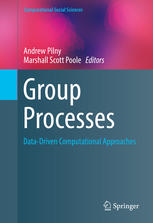

Most ebook files are in PDF format, so you can easily read them using various software such as Foxit Reader or directly on the Google Chrome browser.
Some ebook files are released by publishers in other formats such as .awz, .mobi, .epub, .fb2, etc. You may need to install specific software to read these formats on mobile/PC, such as Calibre.
Please read the tutorial at this link: https://ebookbell.com/faq
We offer FREE conversion to the popular formats you request; however, this may take some time. Therefore, right after payment, please email us, and we will try to provide the service as quickly as possible.
For some exceptional file formats or broken links (if any), please refrain from opening any disputes. Instead, email us first, and we will try to assist within a maximum of 6 hours.
EbookBell Team

4.7
76 reviewsThis volume introduces a series of different data-driven computational methods for analyzing group processes through didactic and tutorial-based examples. Group processes are of central importance to many sectors of society, including government, the military, health care, and corporations. Computational methods are better suited to handle (potentially huge) group process data than traditional methodologies because of their more flexible assumptions and capability to handle real-time trace data.
Indeed, the use of methods under the name of computational social science have exploded over the years. However, attention has been focused on original research rather than pedagogy, leaving those interested in obtaining computational skills lacking a much needed resource. Although the methods here can be applied to wider areas of social science, they are specifically tailored to group process research.
A number of data-driven methods adapted to group process research are demonstrated in this current volume. These include text mining, relational event modeling, social simulation, machine learning, social sequence analysis, and response surface analysis. In order to take advantage of these new opportunities, this book provides clear examples (e.g., providing code) of group processes in various contexts, setting guidelines and best practices for future work to build upon.
This volume will be of great benefit to those willing to learn computational methods. These include academics like graduate students and faculty, multidisciplinary professionals and researchers working on organization and management science, and consultants for various types of organizations and groups.